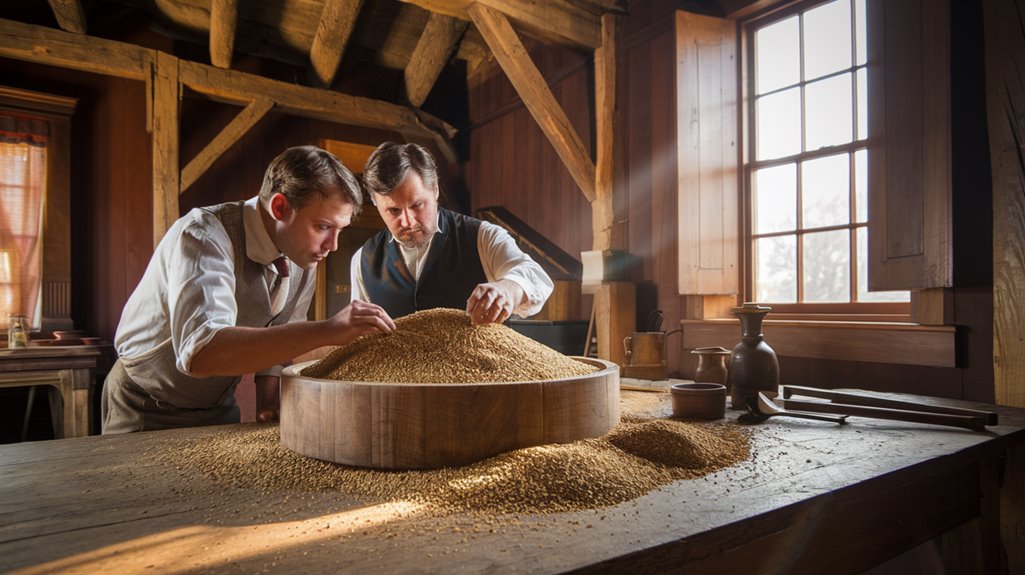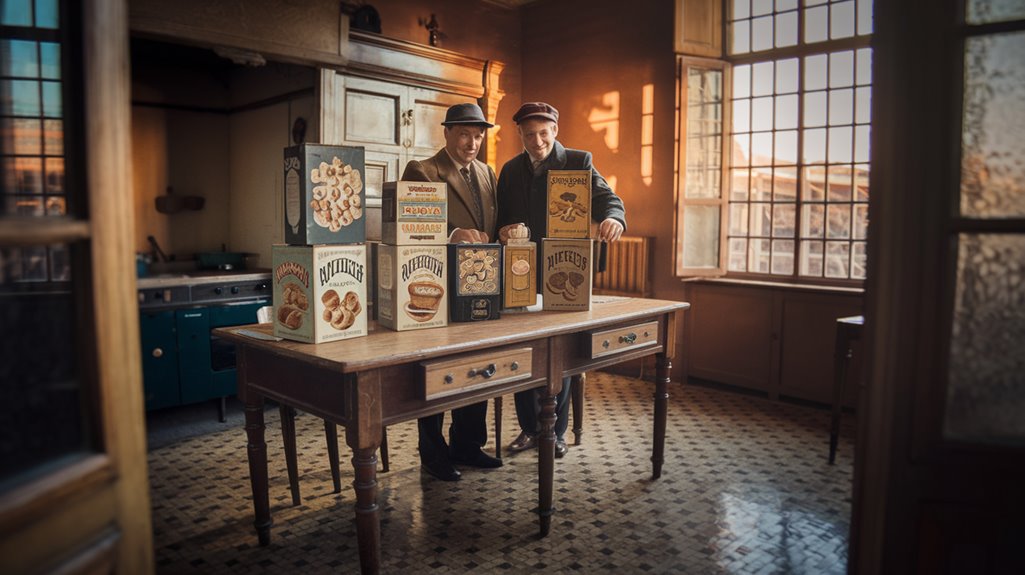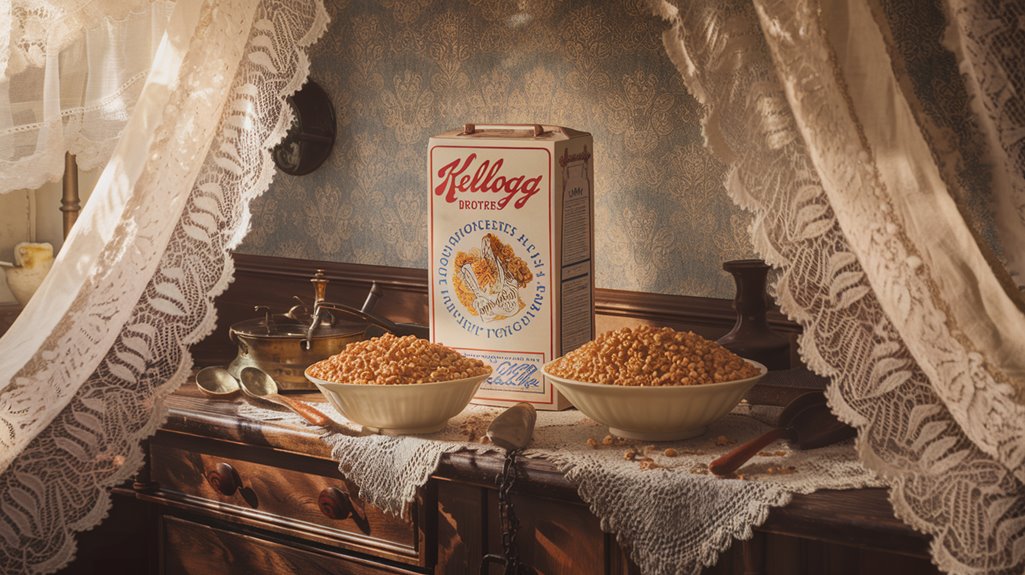Two Men Behind Your Breakfast Cereal
You might casually pour your morning cereal without realizing you're participating in a century-old family drama. Behind those crispy flakes lies a tale of two brothers: one, a strict health reformer with a medical degree, and the other, a business-savvy entrepreneur who'd transform American breakfast forever. Their contentious relationship and competing visions didn't just create a new food category—they sparked a revolution that would change how you start your day. Let's explore what really happened in Battle Creek, Michigan.
The Birth of Cold Cereal: James Caleb Jackson's Granula

Before cold cereal dominated breakfast tables worldwide, Dr. James Caleb Jackson pioneered a remarkable cereal innovation at his New York sanitarium in 1863. His creation, Granula, marked the first-ever cold breakfast cereal, setting the stage for a revolutionary change in morning meals.
You might've found Jackson's original Granula challenging to eat – it required a 20-minute milk soak just to become edible. Made from graham flour dough that was baked twice, this hard-textured cereal emphasized health benefits through its whole grain composition. His innovative cereal created quite a stir, even prompting John Harvey Kellogg to develop his own version. Eventually, he had to rename his product to avoid legal issues with Jackson's original creation.
It offered a stark contrast to the traditional cholesterol-heavy breakfasts of the era. At Jackson's sanitarium, known as Our Home on the Hillside, this development aligned perfectly with the growing vegetarian movement and the pursuit of healthier dietary options in the late 19th century.
From Health Sanitariums to Kitchen Tables
While Jackson's Granula introduced cold cereal to America, the Battle Creek Sanitarium would transform this simple health food into a nationwide breakfast sensation.
Under the guidance of the Seventh-day Adventist Church, the sanitarium became a pioneering force in dietary trends, promoting vegetarianism and healthy living principles. Dr. Kellogg's work was deeply influenced by Ellen White's teachings about the connection between physical health and spiritual well-being.
You might be surprised to learn that your morning bowl of cereal originated in the sanitarium's experimental kitchen, where John Harvey Kellogg developed innovative baking processes to create easily digestible foods. His brother W.K. Kellogg would later establish the Kellogg Company in 1906.
The health benefits of these cereals aligned perfectly with the era's growing concerns about digestive issues and the need for quick, nutritious breakfast options.
As more people began working away from home during the Industrial Revolution, these convenient cereals revolutionized morning routines, forever changing how you'd start your day.
The Kellogg Brothers' Revolutionary Breakfast Creation
As the Battle Creek Sanitarium flourished under John Harvey Kellogg's leadership in 1876, the revolutionary concept of flaked cereal began taking shape in its experimental kitchen.
What you mightn't know is that this cereal innovation happened by accident when wheat dough was left out overnight and then rolled into thin sheets.
The brothers' commitment to breakfast nutrition led them to experiment with various grains, including rice and corn.
Their initial success was remarkable, with over 100,000 pounds of flaked cereal sold in the first year.
You'll find it interesting that while John focused on health benefits, Will saw broader market potential and introduced malt and salt to enhance the cereal's taste.
John's emphasis on healthy eating aligned with his role as director of the Western Health Reform Institute, which he later renamed to the Battle Creek Medical Surgical Sanitarium.
Their differing views on adding sugar eventually led Will to establish his own company in 1906, creating what you now know as the Kellogg Company.
A Tale of Two Rivals: Kellogg and Post
The Battle Creek Sanitarium's success attracted numerous visitors, including an ambitious entrepreneur named Charles William Post. After learning Dr. John Kellogg's granola recipes, Post started his own business, launching Grape Nuts and quickly earning $3 million annually by the early 1900s.
The rivalry dynamics intensified when William Kellogg broke away from his health-focused brother John to commercialize their cereal. Their opposing views stemmed from John's dedication to a strict vegetarian diet. With a background in running the family's broom business, William proved himself a skilled businessman despite being initially underestimated.
Both competitors employed aggressive marketing strategies: Post built health complexes in Battle Creek and Florida, while William launched the clever "Wink at your grocer" campaign for free samples.
When a mysterious fire destroyed the Corn Flakes factory, William improved his manufacturing process with new rollers and conveyor belts.
The competition sparked endless legal battles, especially over the Kellogg name, ultimately reshaping America's breakfast table forever.
How Religious Health Reform Shaped Modern Breakfast

Religious beliefs profoundly shaped America's breakfast revolution through the Seventh-day Adventist Church's radical health reform movement.
The Adventists believed spiritual health was directly linked to dietary ethics, leading them to establish the Western Health Reform Institute in Battle Creek in 1866.
You can trace your modern breakfast habits to these four key Adventist principles:
- A diet centered on vegetables and whole grains
- Elimination of stimulants like coffee and alcohol
- Simple, progressive dietary changes
- Balanced nutrition as a spiritual duty
The Kellogg brothers, raised in this tradition, transformed these religious health principles into practical innovations. Their emphasis on health preservation was seen as a religious duty to glorify God.
Their flaked cereals weren't just a business venture – they represented a systematic approach to improving America's health through better breakfast choices.
Dr. John Kellogg's dedication to health reform earned him a Nobel Prize nomination in 1921 for his groundbreaking dietary research.










